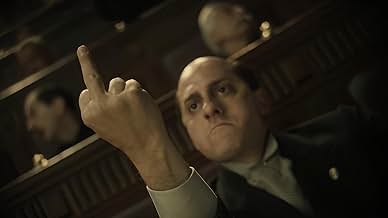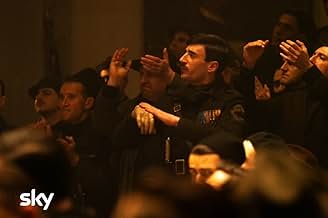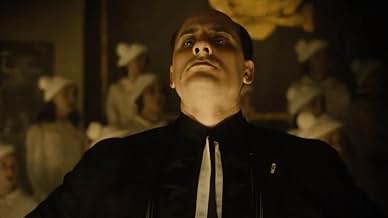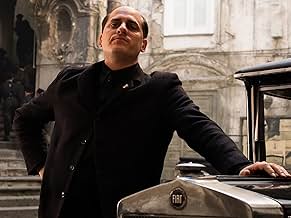Crónica del ascenso al poder del dictador italiano Benito Mussolini en una historia de un país que se rindió a la dictadura.Crónica del ascenso al poder del dictador italiano Benito Mussolini en una historia de un país que se rindió a la dictadura.Crónica del ascenso al poder del dictador italiano Benito Mussolini en una historia de un país que se rindió a la dictadura.
- Premios
- 2 premios ganados en total
Explorar episodios
Opiniones destacadas
By now it is evident that in the Post-network era and when from the zenith the third Golden Age of Television began its inevitable downward parabola no one, including myself, would have expected such a product... especially an Italian one.
M the son of the century is the classic turn of the century, the breaktrough event or, if you like a film allegory better: it is the hero we need but do not deserve. The future of Our television, it is clear, blatant and unashamed that it will be defined by the 'Before M' and the 'After M'.
Beautiful, beautiful series. Monumental every performance. Ficcanti every dialogue. Generative storytelling from history and brought up to date, without ever becoming exhibitionist. A series one step away from hybris without ever crossing the thin line and, because of this, incredibly verisimilitude in its (deliberate) staging between the theatrical and magical realism.
A possible event, because there is a thick book behind it, not only of volume but also of historical research... but also (oh my God, finally!!!) an adequate budget. It matters little that some images are realistically dated in the staging. It doesn't matter. You want the real date? There's the book but in this instalment it was perfectly there.
A futurist Zang Tumb Tumb series like we've needed for a long time. Because, just like futurism, the last true and pure current of thought and artistic movement that since the publication of its manifesto in 1909 has not found to date a worthy new cultural vision that can be described as truly original and not a rinsing of dishes from other shores. This is M. The first of something else in the making that, los peri pernos, will be even more surprising and innovative.
Zang Tumb Tumb.
M the son of the century is the classic turn of the century, the breaktrough event or, if you like a film allegory better: it is the hero we need but do not deserve. The future of Our television, it is clear, blatant and unashamed that it will be defined by the 'Before M' and the 'After M'.
Beautiful, beautiful series. Monumental every performance. Ficcanti every dialogue. Generative storytelling from history and brought up to date, without ever becoming exhibitionist. A series one step away from hybris without ever crossing the thin line and, because of this, incredibly verisimilitude in its (deliberate) staging between the theatrical and magical realism.
A possible event, because there is a thick book behind it, not only of volume but also of historical research... but also (oh my God, finally!!!) an adequate budget. It matters little that some images are realistically dated in the staging. It doesn't matter. You want the real date? There's the book but in this instalment it was perfectly there.
A futurist Zang Tumb Tumb series like we've needed for a long time. Because, just like futurism, the last true and pure current of thought and artistic movement that since the publication of its manifesto in 1909 has not found to date a worthy new cultural vision that can be described as truly original and not a rinsing of dishes from other shores. This is M. The first of something else in the making that, los peri pernos, will be even more surprising and innovative.
Zang Tumb Tumb.
The english subtitles are a disaster. They look like automated translations not reviewed by someone who understand italian. For example "Margarita" (the name of a woman) is translated as "margarita pizza". Or "No, no" is translated "ninth", because in italian "nono" means "ninth".
Sometimes these bugs don't help comprehension. They mix up pronouns: "They kick it out" instead of "They kick him out". They don't take into account the formal you that in italian is she. For some complex sentences there is no analysis done by a human : "his husband".
An amateur job done by incompetents.
Such a magnificent work deserves better.
Sometimes these bugs don't help comprehension. They mix up pronouns: "They kick it out" instead of "They kick him out". They don't take into account the formal you that in italian is she. For some complex sentences there is no analysis done by a human : "his husband".
An amateur job done by incompetents.
Such a magnificent work deserves better.
I mainly focus on the film aspects. Without getting too deep into it, I try to gauge how much truth versus mystification is presented. I don't align with either the right or the left.
This series is one of the most beautiful I have seen in recent times. Mussolini's dialogue with the camera is pure gold. The way he conveys his thoughts, mocks the viewer, and shares his confessions keeps you glued to the screen and makes you feel involved in the story. Marinelli is fantastic! Those who criticize him likely do so for reasons unrelated to his performance. Francesco Russo is superb, and Barbara Chichiarelli is perfect!
This series is one of the most beautiful I have seen in recent times. Mussolini's dialogue with the camera is pure gold. The way he conveys his thoughts, mocks the viewer, and shares his confessions keeps you glued to the screen and makes you feel involved in the story. Marinelli is fantastic! Those who criticize him likely do so for reasons unrelated to his performance. Francesco Russo is superb, and Barbara Chichiarelli is perfect!
The header here is not my line but taken from when Mussolini sometimes bursts through the fourth wall and comments to the viewer. This was a superb attempt at capturing the rise of a chaotic man during one of the most chaotic periods of history.
Mussolini was flawed, selfish, vindictive and thuggish - and so very full of contradictions.
What this series perfectly captures is the influence of Margherita Sarfatti, his lover and his principal advisor. She coins the best line to describe his motivation and that of fascism 'Take what you want by any means.' This is both chilling and a warning from history... One reviewer here talks about how far fetched the story becomes - A Samurai ? Yes he featured in real life. He influenced Italian poets to introduce Haiku! However bizarre the story seems to be, much of what you see is really not that far fetched.
Mussolini was flawed, selfish, vindictive and thuggish - and so very full of contradictions.
What this series perfectly captures is the influence of Margherita Sarfatti, his lover and his principal advisor. She coins the best line to describe his motivation and that of fascism 'Take what you want by any means.' This is both chilling and a warning from history... One reviewer here talks about how far fetched the story becomes - A Samurai ? Yes he featured in real life. He influenced Italian poets to introduce Haiku! However bizarre the story seems to be, much of what you see is really not that far fetched.
Compelling plot, striking photography, excellent acting by Marinelli. Above all, a solid portrayal of a particular historical period.
Much more to be appreciated if you speak Italian, because Marinelli's performance is truly a masterpiece, both from a linguistic and human point of view. M is a winning example of how history should be represented in cinema: hard and raw, without unnecessary words or unnecessary events based on fiction.
I really recommend its viewing. However, do not expect a simple and straightforward viewing; the story is purely described, there is no shortage of harsh scenes and I felt like some stories missed some details.
What is interesting is that the meaning of some of the pictures goes beyond the simple political figure to the man, with his fears and weaknesses. Things that, of the figure of Mussolini, never really came out of that period.
Excellent cinematic work.
Much more to be appreciated if you speak Italian, because Marinelli's performance is truly a masterpiece, both from a linguistic and human point of view. M is a winning example of how history should be represented in cinema: hard and raw, without unnecessary words or unnecessary events based on fiction.
I really recommend its viewing. However, do not expect a simple and straightforward viewing; the story is purely described, there is no shortage of harsh scenes and I felt like some stories missed some details.
What is interesting is that the meaning of some of the pictures goes beyond the simple political figure to the man, with his fears and weaknesses. Things that, of the figure of Mussolini, never really came out of that period.
Excellent cinematic work.
¿Sabías que…?
- TriviaWhen Joe Wright got on board as director, at first he meant to have the actors say their lines in English. Then he changed his mind and chose to shoot the series in Italian, for a higher immediacy.
Selecciones populares
Inicia sesión para calificar y agrega a la lista de videos para obtener recomendaciones personalizadas
- How many seasons does Mussolini: Son of the Century have?Con tecnología de Alexa
Detalles
- Fecha de lanzamiento
- Países de origen
- Sitio oficial
- Idioma
- También se conoce como
- Mussolini: Son of the Century
- Locaciones de filmación
- Productoras
- Ver más créditos de la compañía en IMDbPro
- Tiempo de ejecución52 minutos
- Color
Contribuir a esta página
Sugiere una edición o agrega el contenido que falta

Principales brechas de datos
By what name was M - El hijo del siglo (2024) officially released in India in English?
Responda
![Ver Trailer Season 1 [OV]](https://m.media-amazon.com/images/M/MV5BYWM4MjYyMDktOWQwNy00NzNlLTg0OGUtZjk5Yzk0MjA2YmNlXkEyXkFqcGdeQXRyYW5zY29kZS13b3JrZmxvdw@@._V1_QL75_UX500_CR0)


























